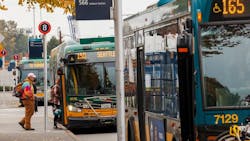King County Council approves Metro’s 2026-2027 budget
The King County Council has granted approval to King County Metro’s 2026-2027 budget. The budget totals $4 billion across King County Metro’s operating and capital programs, including all its modes of transit. The budget also covers safety, cleaning, zero-emission priorities and adds more than 400,000 hours of King County Metro bus service, among other priorities.
“This budget reflects King County’s values, which means delivering a balanced plan that protects essential services, increases efficiency and reinvests in programs that most benefit our residents,” said King County Executive Shannon Braddock. “This newly approved budget reflects many of the priorities I outlined in my 200-day plan, including protecting key services, enhancing public safety, safeguarding our emergency preparedness efforts, increasing transit access and resisting harmful federal funding rollbacks.”
The budget outlined several goals for the agency in the coming year, including:
Added bus service: King County Metro says it plans to add more than 400,000 service hours to connect riders to new Sound Transit Link light-rail stations, provide more frequent service and redesign service to meet current and future needs.
RapidRide expansion: King County Metro also notes it plans to expand its RapidRide network with investments designed to increase ridership. This includes building and opening the RapidRide I Line (between Auburn, Kent and Renton) and the RapidRide J Line (between Belltown and the University District). The agency says it’s also continuing to plan for the RapidRide R Line (serving Seattle’s Chinatown-International District, Mount Baker, Columbia City, Hillman City, Brighton and Dunlap) and the RapidRide K Line (serving Bellevue and Kirkland).
Improving transit, including in rural areas and south King County: The budget defines funding for Access Paratransit, Dial-a-Ride Transit (DART), the King County Water Taxi, Metro Flex and Sound Transit Link light rail. The budget also creates new Metro Flex pilot zones in Auburn and Federal Way. The expanded frequency of Snoqualmie Valley Transportation would be continued and in alignment with expanding service in unincorporated areas of King County.
Making transit safe and welcoming: In an effort to continue improving safety and security on and near King County Metro, the budget also extends the Safety, Security and Fare Enforcement (SaFE) Reform initiative. The initiative includes the Behavioral Health Support and Metro Ambassador programs. The budget also maintains expanded staffing for King County Metro Transit Police and Transit Security Officers, as approved by the King County Council in the recent 2025 supplemental budget.
Cleaning buses, bus stops and transit centers: Funding was also carved out to enhance the rider experience, making permanent the frequent cleaning of bus interiors and continuing a pilot project delivering additional cleanings of high-priority bus stops.
Upgrading air quality and tackling climate change: The budget also focuses on climate and the environment, adding staff and support services for the future Tukwila bus base—the agency’s first bus base designed specifically to support zero-emission buses. Tukwila Base is set to open in 2026 and serve up to 120 battery-electric buses. King County Metro’s other bus bases will transition existing diesel-hybrid buses to run on renewable diesel.
Hiring operators, supporting community members and looking ahead to the World Cup: Other notable investments made in the budget include continuing the Service & Workforce initiative to hire and train the bus operators that provide transit service, providing transportation to residents of the Health Through Housing initiative within the Department of Community and Human Services and delivering additional service during the 2026 FIFA Men’s World Cup.
